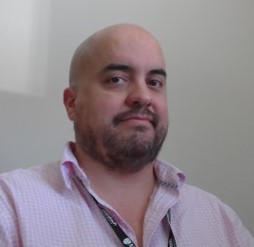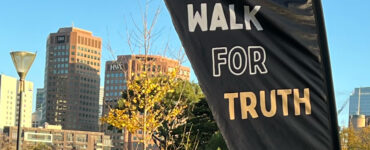The idea of LGBTQ+ people participating, ministering, and leading in Australian Pentecostal-Charismatic Christian churches may seem like the conjunction of mutually exclusive worlds. Yet it was my privilege to interview some of the extraordinary individuals who inhabit these two worlds for my book Happy: LGBTQ+ Experiences of Australian Pentecostal-Charismatic Christianity.
If Australians today know anything about Pentecostal-Charismatic Christianity (PCC), they likely recognise it as the faith of a former prime minister. Prior to his “I believe in miracles” election victory in 2019, Scott Morrison was filmed worshipping PCC-style at his church — arms raised and eyes closed as music plays.
PCC is a form of Christianity, originating in the early twentieth century, which puts particular emphasis on the experience of God’s Holy Spirit, often in the presence of music. Indeed, Australian PCC churches such as Hillsong and Planetshakers produce and export worship music intended to catalyse the “encounter” — the ecstatic trance experience PCC participants enjoy in their gatherings. One of the people I interviewed, named Gabriele, summed up PCC spirituality well:
I love the fact that it’s alive, so you can go to a prayer meeting and actually hear from God direct, and then you could get a word for someone and be free to share it. You can be happy to lay hands on someone who is sick and see their healing. I believe in miracles today, so I believe we could walk down the street and pray for someone, and that would be cool, to see God at work in that way. I’m very comfortable with someone giving a word in tongues and someone else interpreting it … I’m happy to see people dance in churches if that’s what they feel they want to do.
While there are a number of different accounts of where Pentecostal-Charismatic Christianity originated — among them, the Azusa Street revival in Los Angeles in 1906, the Bethel Bible School in Kansas in 1901, and Moriah Chapel in Wales in 1904–5 — what remains consistent is the centrality of the belief in and expectation of the felt encounter with God.
The most characteristic doctrine of the early Pentecostals was the “baptism of the Holy Spirit” — an experience understood to manifest in the enigmatic sounding phenomenon “speaking in tongues”, to which Gabriele refers above. The belief that speaking in tongues represents the “initial evidence” of baptism in the Holy Spirit remains at the heart of what is now often called “classical Pentecostalism”, yet today the movement is considerably more theologically diverse. Perhaps the biggest single change was the “charismatic movement” beginning in the 1960s, which brought Pentecostal experience to mainstream Christian churches. Hence, scholars are likely to refer now to “neo-Pentecostalism” or (as I do) “Pentecostal-Charismatic Christianity” to indicate that the faith is not monolithic.
Apart from their focus on spiritual experiences and gifts — including speaking in tongues, divine healing, and prophecy — a significant emphasis of PCC has been and remains the importance of holy or sin-free living. While the latter is important in Christianity in general, PCC’s heritage in the Holiness Movement has arguably resulted in a particularly exacting requirement for participants to be free from sin. In fact, it may be that PCC’s at times “fuzzy” distinction between the theological doctrine of “justification” (the belief that an individual is saved by God’s grace regardless of their own actions, through the death and resurrection of Jesus) and “sanctification” (the process whereby one becomes more increasingly holy and free from sin) has led many Pentecostal-Charismatic adherent to anxiously question: Am I holy enough to be saved?
Certainly, anxiety regarding salvation and the fear of hell was expressed by many of the LGBTQ+ people I spoke to, who tended to feel that simply being LGBTQ+ made them unacceptable to God and the church. This is well expressed in Wynn’s experience of growing up attending PCC churches and Christian schools:
Like, I knew I wasn’t attracted to girls … I didn’t even know what … “gay” meant, or anything like that … but at the same time going to church and being in a Christian school, and we were taught that it was sinful and that we’d be going to hell, and that … you shouldn’t even have anything to do with LGBT people.
However, some of these elements are present in conservative Evangelical Christianity in Australia, which tends to be even more proscriptive concerning LGBTQ+ people and issues. The questions remain: What is unique about the experience of LGBTQ+ people participating in Australian PCC churches? What is it like to attend an Australian PCC church today?
“Greedy institutions”
The diversity of PCC makes it difficult to sketch a “typical” PCC church or experience. That said, research suggests that some modern Australian PCC churches tend to place a higher emphasis on growth and congregational participation. A helpful way of understanding these “growth churches” — which include Australian “megachurches”, or churches with more than 2,000 attendees, all of which are PCC churches — is as “greedy institutions”.
This concept was developed by the sociologist Lewis Coser, who theorised that modern individuals order their lives by balancing a number of different affiliations: work, family life, voluntary organisations, and so on. However, this balance is jeopardised by what he calls “greedy institutions” — affiliations which place such a high demand on an individual’s time and energy that time for other commitments is sacrificed. Greedy institutions do not coerce these elevated levels of involvement, but typically leverage a “higher claim” on an individual’s time and energy — a payoff that makes the extra commitment worthwhile.
The experiences of most of the LGBTQ+ people I interviewed reflected the greedy nature of many PCC churches. For example, Sage’s commitment to her church not only absorbed the entirety of each Sunday, but extended into the week:
I … was a core member of the team, I was there week in, week out, I never took a week off, I never went away, I never did anything else … I just rocked up to every meeting, I was at church maybe four or five days a week. I was there on Sunday mornings from 6 o’clock in the morning until … 9 or so at night … I’d barely leave to get lunch.
Similarly, Yule’s schedule is exhausting simply to read:
I would get up at 6:30 … every Sunday. Get to church at 7, because I was on worship team. Church started at 10. We had practice from 7 till 9:30 … and I was a leader, so throughout the week I’d be emailing people in the church with their vocal parts, prayers. And then church would go from 10 to 12, we’d have lunch together … then we’d have Bible study from 4 till 6, which would then go to 8 … that was just Sunday. So we had Bible study on Wednesday … And then every morning as I woke up I would read the Daily Bread … I’d pray every night.
The higher claim that PCC churches leverage extends beyond participants’ belief that they are worshipping God through their service. Moreover, participants experienced a rich community life, which they deeply grieved the loss of if they left — as most eventually did. Such a loss is reflected in this description from Sage:
I just had so many mates … 12 years, I think, I lived there … I’d built up 12 years of mates, so 12 years of history, and future as well, and just 12 years of memories and stuff with all sorts of people and I just had such a great family connection, it was really strong … I feel like there’s never, ever been a time in my life, and possibly never will be again, when I felt so strongly connected.
The rich experience of community and the belief that they are serving God through serving the church often resulted in a stratospheric level of time and energy committed to church life and activity. What is evident in the stories emerging from some of the largest PCC churches in the United States, Australia, and New Zealand is the fact that some PCC leaders exploit this higher claim.
Furthermore, as Coser theorised, such “greedy institutions” often employ a “morality of extremes” which is at odds with the norms and mores of the society beyond the institution — conservative views of sexuality and gender being a salient example — and tend to be intolerant of divergence or approaches perceived as critical of this morality, or the institution itself. This was demonstrated in the fact that most of the participants I interviewed who left their churches never heard from their formerly close-knit communities again.
“The line”
While there were generally a host of reasons why many (though not all) of the participants I interviewed left their PCC churches, most cited the conflict between conservative church norms and their own sexuality or gender identity.
In the first volume of his History of Sexuality, the French philosopher Michel Foucault traced the beginnings of a “science of sex” (scientia sexualis) in the nineteenth century and the emergence of a “discourse” which would come to be known as “sexuality”. Foucault’s rather idiosyncratic use of the word “discourse” can be confusing here. He did not mean by it only terms and discussion related to a particular topic —certainly, for Foucault, “discourse” includes these, but it also involves the practices, language, techniques, and overall conditions that produce the acceptable “truth” in relation to something. The discourse of “sexuality”, then, was a modern and scientific attempt to arrive at the “truth” concerning sex.
Taking the side of what I call the “transformation discourse”, conservative Christian churches, including most Australian PCC churches, regard non-heteronormative sexuality and gender nonconformity as either sinful or pathological. Same-sex desire or gender non-conformity were either to be transformed — which is why PCC churches and their leaders have typically been some of the most enthusiastic proponents of Sexual Orientation and Gender Identity Change Efforts” (SOGICE), or what is usually called “conversion therapy” — or could never be acted upon. This latter position, which is probably more common in PCC churches today, is sometimes referred to colloquially as either the “celibacy requirement” or simply “the line”, and requires that LGBTQ+ people abstain from non-heteronormative romantic or sexual relationships.
Xavi, who had been a long-time member of a large PCC church before coming out, described the experience of being welcome in his church, but not having his sexuality “affirmed”:
You were welcome but not affirmed. So “We want you, we love you, and you’re welcome, and we want you to come to our church, but effectively that’s where it ends. If you want to be part of the church, you … can be gay, but you have to be celibate.” … That’s the line.
While some of the people I interviewed were committed to remaining celibate, they acknowledged the uneven nature of the burden they were asked to shoulder. Harley, who was very pleased with the support of his PCC church despite their requirement that he abstain from romantic relationships with other men, nevertheless was blunt about the cost:
A homosexual man … will never be able to carry the hope that his sexual desires are going to be fulfilled in a covenant marriage. That’s never going to happen. If you’re a young, single heterosexual man, you have to exercise self-denial in following Jesus, self-denial in the realm of sexual purity and restraint there … it’s a deeper level of self-denial. It’s not the, “Oh well, not now, but one day, when it’s right.” It’s, “Not now, not ever” kind of thing.
While Harley’s response was to “press in” to the experience of God more, others I interviewed were no longer prepared to accept the strictures of the transformation discourse. Foucault argued that a “reverse discourse” also emerged in the mid-nineteenth century, championed initially by homosexuals who wanted freedom for diversity of sexual practice. This reverse discourse has gained power over the course of the twentieth and twenty-first centuries, and now counts the disciplines of psychiatry and psychology, where homosexuality was once regarded as pathological, among its allies.
Arming themselves with the resources of the reverse discourse, including the burgeoning field of LGBTQ+ positive theology and biblical studies, many of those with whom I spoke assembled what Andrew Yip calls a “counter-rejection” of the conservative mores of their churches. Yule, for example, realised that convincing his parents that their beloved son was not going to hell for being gay would require an engagement with the “clobber passages” — which is to say, portions of scripture which have at times been used to condemn LGBTQ+ people:
I wrote them a five-page essay … because all they know is that gay equals hell … and it’s wrong, and — so I actually extrapolated each of the five Bible verses and wrote an essay, which had a counterargument about those five Bible verses, to educate my parents … I think education is really the key; not just telling them … because their fall-back position is, “Well, it’s in the Bible. God said this [and] The word of God is true.”
Jace’s counter-rejection referenced the contradiction between her former church’s message of charity to those most in need and their failure to practice the radical acceptance she witnessed in the Jesus tradition:
Sometimes they do engage with a charitable Jesus, and they do definitely talk about a theoretically accepting Jesus, but they’re certainly not the radically accepting church themselves. I would love to see more engagement with Jesus who advocates for the poor and the meek and the outcast amongst you, which in today’s day and age is very much the LGBTI, but there are many other groups.
“The battleground”
My research reveals what I’ve called a “discursive death-match” being fought over the “truth” of sex and gender. Although it is easy to presume that those aligned with the reverse discourse — who are advocating the full inclusion of LGBTQ+ people — are “winning” or are “on the right side of history”, what is evident rather is a never-ending dance of power. Where once PCC and other conservative Christians simply dismissed homosexuality as sinful, or advocated for miraculous “healing” or therapy, more recently the public face of the conservative position is the celibacy “line”.
Whereas once LGBTQ+ people would remain in the closet, fearful of reprisals if their “sinful” desires and actions were known, more are now willing to challenge and even counter-reject conservative norms. And the dance goes on, with the power of the two discursive positions waxing and waning, but neither ever getting the decisive upper hand.
Neither side in this discursive contest can ultimately yield ground, because for many Evangelical and PCC churches, the position that being LGBTQ+ is sinful and proscribed has become a litmus test of “orthodoxy” — of who is truly Christian, and who is not. Similarly, for LGBTQ+ people and their allies in Christian faith, the line is not perceived as a requirement that LGBTQ+ people change their behaviour, but cease being what they are — that they cease to exist. This is what I call the “battleground” over the “truth” of sex and gender, where the grounds are existence itself, and surrender is unthinkable.
It would be disingenuous, however, to conclude that the costs of fighting on this battleground are borne equally. This grim reality is attested by Zan, an LGBTQ+ man who made the decision to remain in his non-affirming PCC church:
I’d lay awake at night just wishing I was no longer existing, then I realised that the only way I could please God was to reject my sexuality … I realised I had to help myself by shutting down my feelings, realised that I’d never, ever be happy in a relationship, or possibly in life at all, but that was worth it to sacrifice my life for God.
While at the time of the interview, Zan was in a healthier place, having found a way to integrate his faith and sexuality while staying in his church, he was not the only one who share stories of wishing simply to cease existing — of feeling that he was “wrong”. Stories like these and many others demonstrate that the “battleground” can never be an abstraction for LGBTQ+ people of faith, but is fought out in their bodies and souls.
Mark Jennings is Senior Lecturer in Religious Studies at Wollaston Theological College in Perth, Western Australia and the University of Divinity, and the Continuing Education Coordinator for the Anglican Diocese of Perth. He is the author of Happy: LGBTQ+ Experiences of Australian Pentecostal-Charismatic Christianity.

Mark Jennings is Senior Lecturer in Religious Studies at Wollaston Theological College in Perth, Western Australia, and the Continuing Education Coordinator for the Anglican Diocese of Perth.






Very well presented. Every quote was awesome and thanks for sharing the content. Keep sharing and keep motivating others.
This is a fantastic piece of content. I appreciate the thorough research and the practical tips provided. Well done!